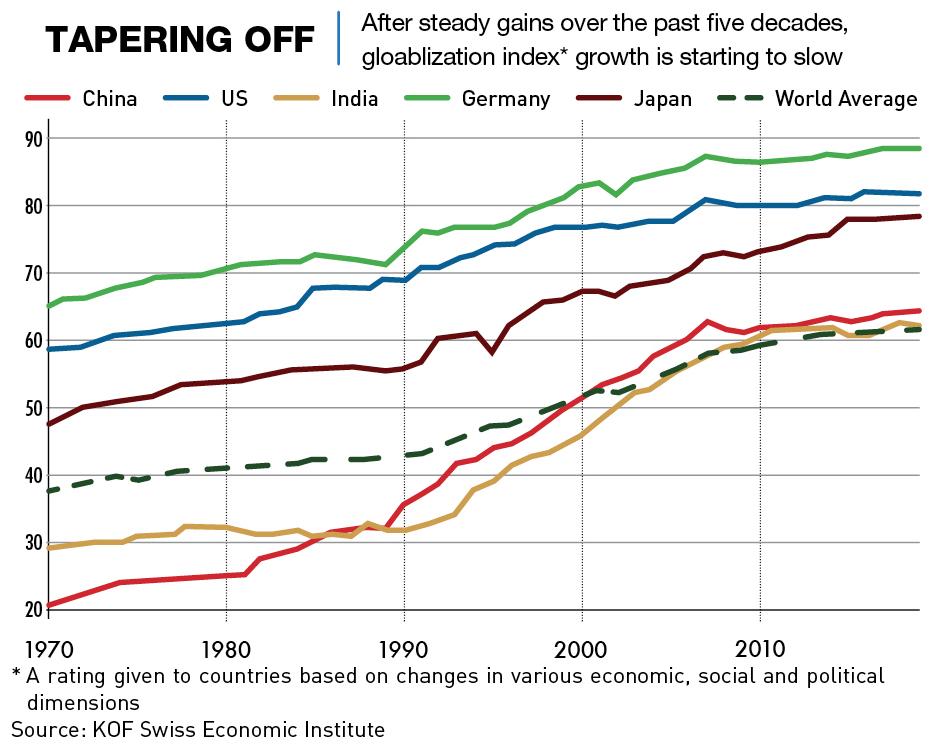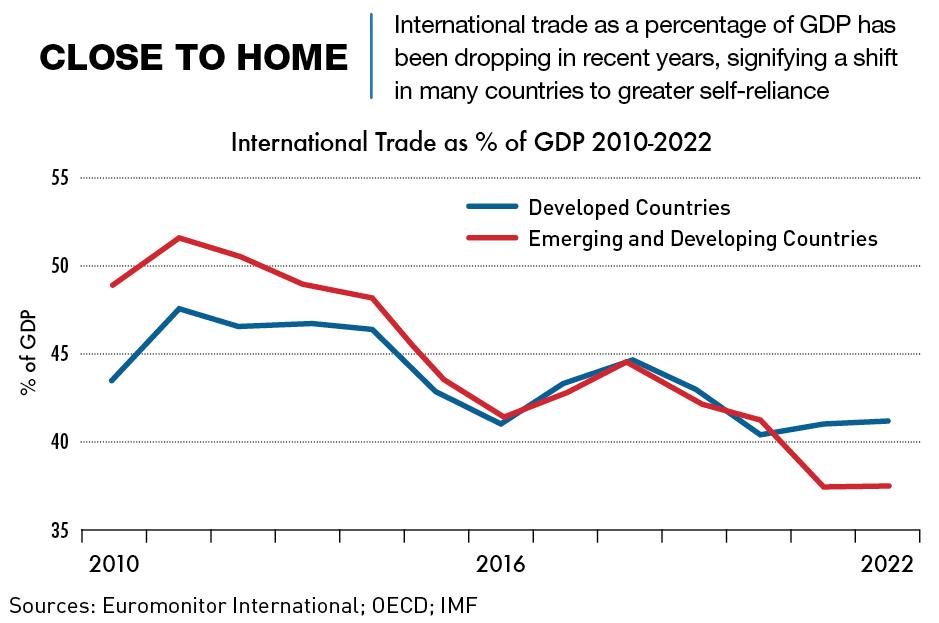Globalization in its current form appears to be ending. As we enter its next stage, it’s important to keep some key lessons in mind
Zhou Li, Assistant Dean of the Cheung Kong Graduate School of Business, Editor-in-Chief of CKGSB Knowledge
All commentaries reflect the personal opinion of the author and are not necessarily the official position of the school and the magazine
The end of the Cold War in 1991 resulted in the development of a new geopolitical and global economic landscape, offering crucial lessons that if heeded might have helped the world stay on a peaceful course. But instead, the last three decades have seen an increasing disregard for various aspects of the international rule of law by the great powers of the world, and if those at the top break away from agreed norms, then others may follow.
The war in Ukraine is a symptom of growing fractures in the international fabric, and, worryingly, the conflict signals the risk for an even larger war, the prospect of a digital conflict, the exacerbation of global food and energy crises, and a continuation of a political race to the bottom. All of this could have been avoided if we had learnt lessons from the past: similar to how the Congress of Vienna after the Napoleonic Wars helped prevent another widespread European war for nearly 100 years, despite there being legitimate criticisms of the structure of the agreement.
The prioritization of national security is now at the forefront of thinking for many countries and with it accelerates the rise in economic nationalism and protectionism that started about a decade ago, which in turn enhances an “us against them” mentality that permeates all levels of politics.
Of course, it would be naive to say that there will not be disagreements and points of tension between the world’s major countries. Different viewpoints mean these are inevitable. But maintaining an automatic baseline of confrontation on any subject simply out of political principle or domestic political agenda, can only damage the world’s already strained economies and escalate political or even military tensions. All countries, large and small, have legitimate national security concerns that need to be respected and addressed, and constantly crossing lines drawn in the sand can only push the world towards another major international crisis.
Back to cooperation
Although it is by no means the only such fractured global relationship, the US-China connection is an obvious example of a shift from partnership, to co-operation, and now to a state of competition, at a time when collective leadership is urgently needed. Putting an end to the war in Ukraine and preventing any subsequent conflicts which have the potential to cause so much human suffering, rebooting the world economy after the pandemic, and the fight against climate change and global warming are among the many challenges that require cohesion from the world’s largest economies.
US politicians are unusually unified in their approach to China, viewing the country as a largely negative force in the world and one that, if unrestrained, will inevitably overtake them. On the other side of the divide, meanwhile, there is a belief that the US acts only from self-interest and a desire to defend its position as the world’s number one economy.
A hardening of positions seemingly simply for domestic political gains, leaves little room for nuance and has already led to the stifling of business and the ratcheting-up of political tensions around the world. There is a great need for reflection on all sides, especially for those who seek to exacerbate existing issues, concentrating on the true motivations behind perceived adversarial stances and their possible future cost, both to themselves and to the world as a whole.
This relationship trajectory is not simply limited to the US and China. All countries have a responsibility to acknowledge the rights, interests and concerns of their international counterparts. There is a need for all sides to respect each other more, and people at the policy level need to understand the importance of taking into account the national concerns of other countries, not just their own.
The next stage
While everything that is happening now may add up to the end of globalization as we have known it over the past 20 or 30 years, it surely does not mean the end of globalization as a whole. Rather, we expect that the process will move forward but with a shifting of priorities and changes in the roles of multilateral institutions, major economies, governments, companies and individuals. For most of the modern era, economics has been the driving force behind international cooperation and global development, but given current events and the geopolitical uncertainties that the world faces, national security issues, perceived or real, are becoming a top priority in many countries.
So while inevitably, globalization will continue in some form or another, it is very likely that we will see fundamental splits, with decoupling now being almost unavoidable. In such a scenario, the economic spoils are going to go to those economies and companies that can succeed in multiple markets. Countries like India, Singapore and many others that have not excluded themselves from any particular market are far better positioned than those which abstain from one or another. Examples of companies could be Apple, whose sales of computers and iPhones in the Chinese market are still strong, ByteDance with its sister apps Douyin and TikTok, and Tencent, which is seeing international success through behind-the-scenes ownership of major gaming companies in the West. Companies which are stuck in one market or the other are likely to lose out.

Fractured globalization
The fractured nature of the next stage of globalization that we foresee will lead to different sectors being globalized to varying extents. The sourcing of parts for mass-manufactured products will continue to be mostly decided on the basis of cost, and they will continue to be fully-globalized commodities. There are few national security concerns with regard to cheap, basic electronics, for example.
There will be a geographical global split between high-value commodities and common, low-cost products. Again, a company that can straddle each of these market sectors will have a higher chance of business. But the higher up the value chain you go, the closer you get to something that might have an effect on national security, thus you will see a lower level of globalization. The clear lack of cooperation between the world’s major nations on space technology provides a good illustration of this.
During this round of globalization that is coming to a close, China became the unquestioned leader in low-cost production and has developed one of the world’s most comprehensive domestic supply chains, but the country is now also home to world-leading innovation in many areas and in general, aims at developing into a producer of high-value technologies. The country’s views on its competitors, in particular the US after the situation with Huawei, has also shifted, and many in China seem certain that future development has to be achieved independently. China has introduced the “Dual Circulation” policy to encourage domestic production to cover the dangers of an increasingly unstable international market. This means that in the near future, China will be looking to increasingly turn to emerging markets for the bulk of its trade. But it is likely to retain a significant role in the US market if for no other reason than its lower cost of production and logistics efficiency, for without a drop in production costs, the US faces a serious risk of increased inflation.

It is in the emerging economies, mostly in Asia and Africa, that the next promising markets can be found, and it is already clear that companies that have seen success in China have a higher chance of doing well in emerging markets, due to the similarities in the level of economic development. Many successful international companies in Southeast Asian markets are Chinese and there are very few US companies with a solid presence in that region. In Africa, which has been largely an open playing field for business over the past 20 years, Chinese companies are clearly winning. All this also highlights the ongoing importance of China as a market.
Public and private
But, as we have mentioned in our Spring 2020 and Winter 2016 commentaries, the private sector will still need to play a major role in the new phase of globalization. The fact that there is a growing adversarial aspect to international relations is another good reason to place greater emphasis on cooperation between private business people, who tend to have more autonomy and often are more pragmatic and innovative. Many top business leaders still see immense value in global markets that their governments may see as dangerous competitors, and believe that rhetoric-driven policies and sanctions ultimately hobble the competitiveness of their domestic private companies.
Elon Musk, for example, is well-known for being outspoken on issues, with opinions that may go against the current political tide, and for good reason. Tesla has seen great benefits from its Shanghai manufacturing facility, with its China revenue more than doubling two years in a row, and SpaceX has demonstrated a great deal more efficiency than NASA, given similar levels of funding.
China has got to where it is today by creating a balance between SOEs and the private sector, and giving full reign to the positive energy of private enterprise is important in making sure that China has the capability to compete effectively in the new phase of globalization, and in particular the digital economy, where entrepreneurship and innovation will be more critical to its global competitiveness than ever before.
Actions by China’s government can be extremely effective in terms of boosting economic growth and offsetting threats to economic development, but at the same time an overly heavy hand can have negative effects. Something we saw 40 years ago, before the “Reform and Opening Up” policies were introduced.
Apart from the role of the private sector, there is also an important trend in the growth of a public desire for business to take on more social responsibilities. While China can, again, learn from other parts of the world and develop its own model in this regard, all countries need to be careful that their ESG initiatives do not act as greenwashing.
Globalization, again?
While globalization as we have come to know it over recent decades may be coming to the end of the road, the next stage of globalization will similarly involve both opportunities as well as risks, and the private sector is going to be key for all countries in navigating through this transition successfully.
The increasingly adversarial nature of political discourse between the world’s great powers is a worrying trend, and could quite easily lead to an expansion of the various global crises that we are already facing. There is a sense that politics wants to keep the world divided, but people today are inexorably connected through technology, culture and, importantly, business. It is vitally important that these connections are well-maintained and promoted through dialogue at all levels, from thought leaders to businesses people and regular citizens, because while the new era of globalization will be more fragmented, it is critical that it does not lead to complete separation of the parts that make up the whole.




















